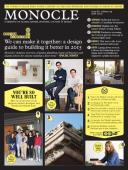
Issue 83
We can make it together: a design guide to building it better in 2015. Monocle’s industry of perfect plumbing, sharp architecture and elegant joinery for anyone wanting a finer home – Special Survey.
In This Issue
Oops! No content was found.
Looks like we no longer have content for the page you're on. Perhaps try a search?
Return Home

